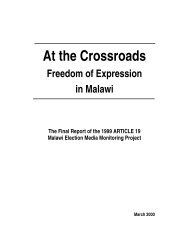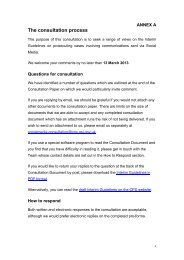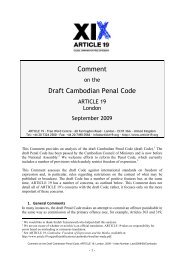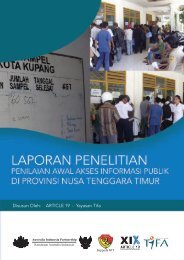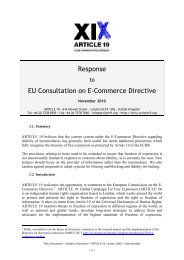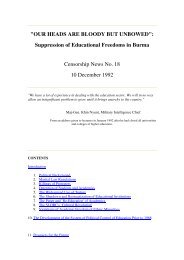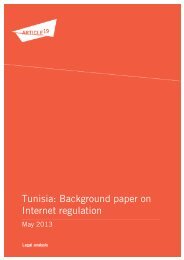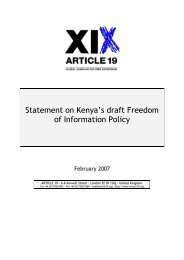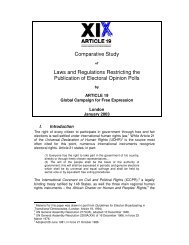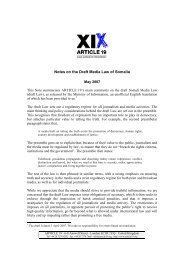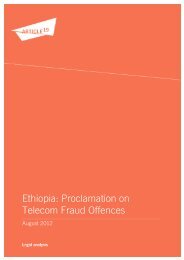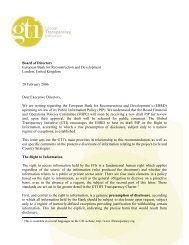FOR INTERNAL USE ONLY - Article 19
FOR INTERNAL USE ONLY - Article 19
FOR INTERNAL USE ONLY - Article 19
- No tags were found...
You also want an ePaper? Increase the reach of your titles
YUMPU automatically turns print PDFs into web optimized ePapers that Google loves.
ARTICLE <strong>19</strong>GLOBAL CAMPAIGN <strong>FOR</strong> FREE EXPRESSIONare required to consult with the MEP when implementing projects, but in practice this does not alwayshappen. This is the case, for example, with the Ministry of Transport when it comes to roadconstruction. 218Legislation neither sets out in detail how people can exercise their right to information norplaces any legal responsibility on public bodies to provide technical assistance to citizens or undertakepublic education measures to promote access to information. This means there is limited pressure onthe authorities to develop their capacity to respond to requests for information.There are also several problematic provisions in the law that hinder its implementation. Forexample, the absence of clear regulations in the Law on Information about costs for the provision ofinformation causes confusion. <strong>Article</strong> 36 specifies that State bodies determine the procedures ofpayment, without further detail. In some cases, public officials have refused to provide informationbecause of the large amount of photocopying involved, even though people have a right to receive thedocuments if they are willing to bear the costs.There are also no legal regulatory frameworks for the provision of informationelectronically. 2<strong>19</strong> According to the Law on Information, the authorities only have a duty to reply toinformation requests submitted in writing. In practice, they might reply to information requests overthe telephone or by e-mail, but they are not formally obliged to do so.Legal guarantees on access to justice are often undermined in practice because of the low levelof public awareness or that the unfair denial of access to information can be challenged in court. Lackof clarity about court costs also deters people from filing court cases.9,&,& %6 Institutional capacity to disseminate environmental information, and thereby enhance goodenvironmental governance, needs to be strengthened. This means increasing budgetary, technical orhuman resources.-%.Insufficient financial resources have been set aside in institutional budgets for public information –and those resources that have been allocated are often not managed efficiently. 220 A 2006 study by218 Interview with Borys Vasylkivskyy, EcoPravo-Kyiv, see note 211. Other bodies/ministries that have animpact on the environment and so should liaise effectively with the MEP include the State Committee ofForestry and Water Management, the Ministry of Architecture, the Committee on Metallurgy, the Ministry of theCoal Industry and the National Committee of Atomic Energy.2<strong>19</strong> Including provisions on the procedure for submitting electronic information requests or their status comparedto that of written requests.220 Interview with the Civil Defence Institute, see note 80.For Internal Use Only. Is Post-Chornobyl Ukraine Ready for Access to Environmental Information?ARTICLE <strong>19</strong>, London, 2007&&



